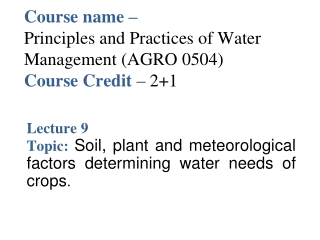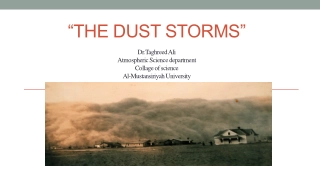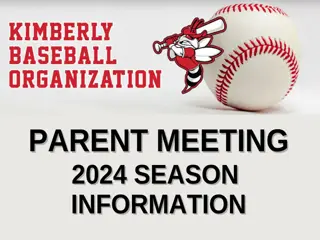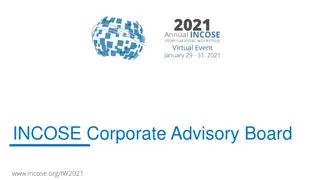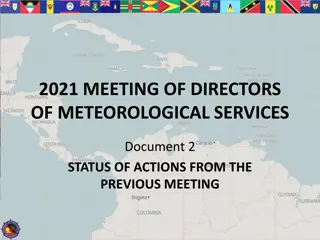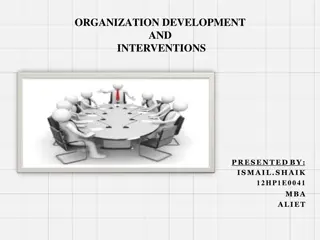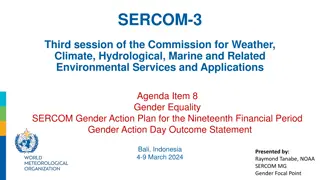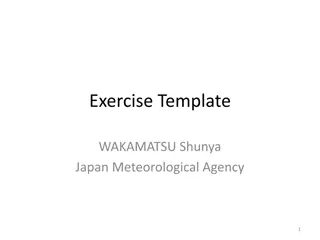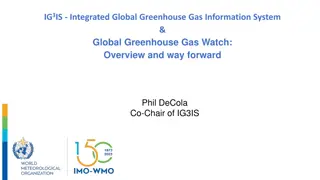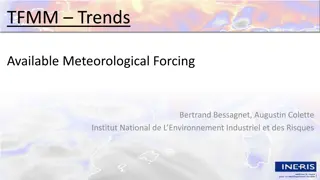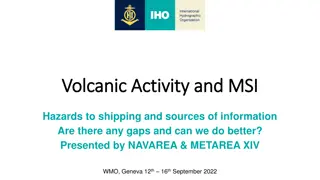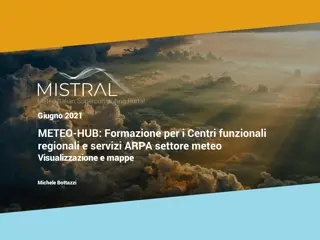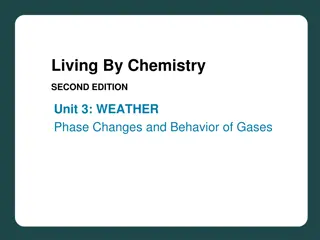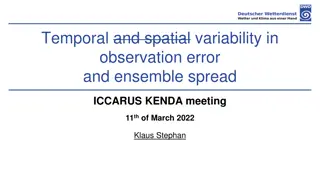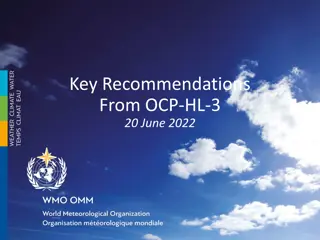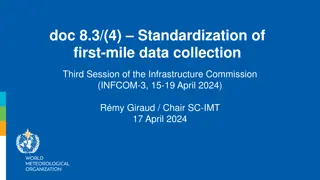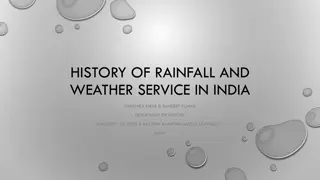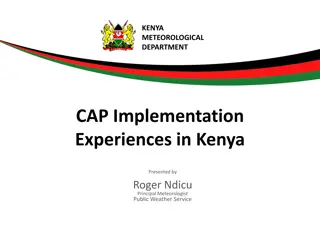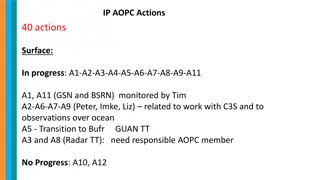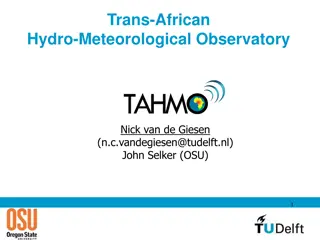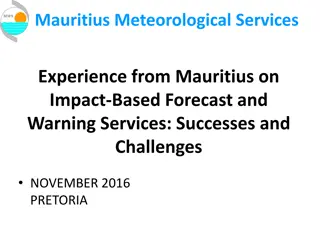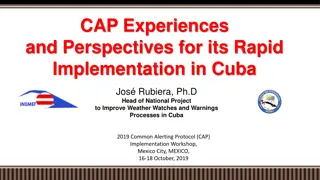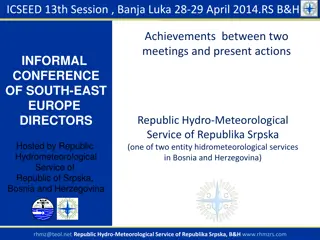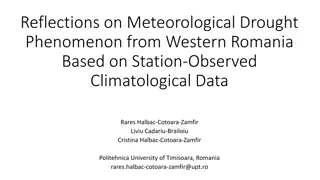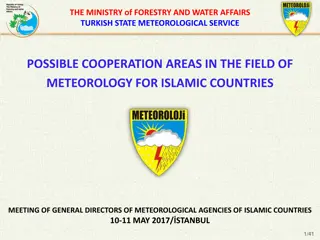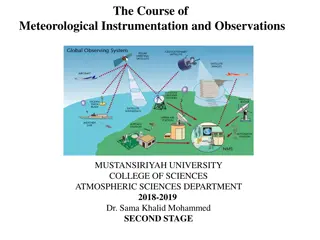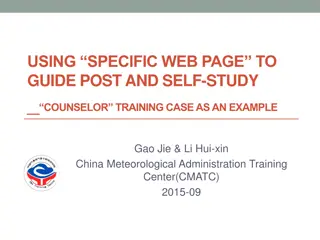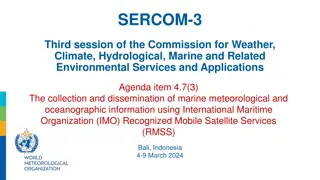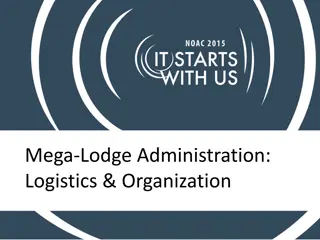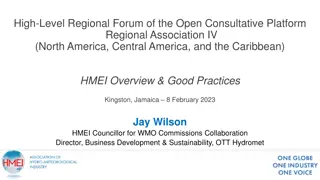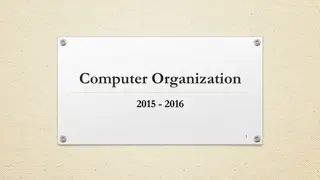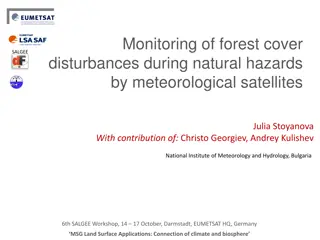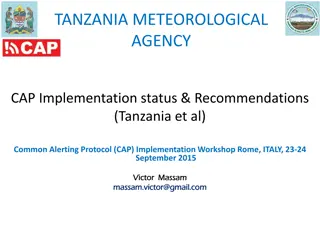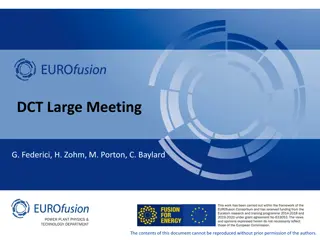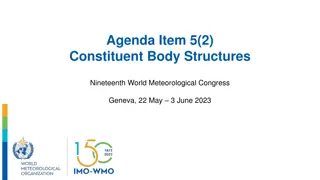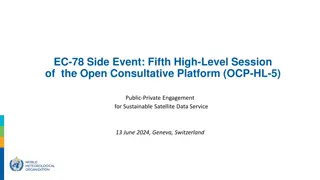Week at A Glance for Science
The sun, land, and water affect climate and weather. Analyze Earth's atmospheric layers, energy transfer processes, wind systems, and meteorological events. Investigate the sun's heat transfer and its influence on air, land, and water. Learn about air pressure, weather fronts, and the effects of oce
3 views • 9 slides
Understanding Water Needs of Crops Based on Soil, Plant, and Climate Factors
How soil, plant, and meteorological elements impact water requirements of crops. Dive into the effects of temperature, solar radiation, pressure, wind, and humidity on crop production and growth.
2 views • 19 slides
The Dust Storms
Dive into the world of dust storms with Dr. Taghreed Ali from Al-Mustansiriyah University. Understand the origins, impact, and formation of these meteorological phenomena, with insights on factors, causes, and effects. Explore the significance of dust storms in atmospheric science.
1 views • 12 slides
Initial Composition and Requirements of GBON for Effective Meteorological Monitoring
The 19th World Meteorological Congress established the Global Basic Observing Network (GBON) to enhance meteorological monitoring worldwide. The GBON includes specific resolutions, guidelines, requirements, and compliance criteria for surface land stations, upper air stations, aircraft data, and rem
2 views • 24 slides
Kimberly Baseball Organization - Supporting Youth Baseball in the Kimberly Area School District
Kimberly Baseball Organization (KBO) is a non-profit volunteer organization dedicated to organizing, managing, and developing high-quality baseball players within the Kimberly Area School District. They offer affordable youth baseball programs focusing on teamwork and sportsmanship, catering to boys
1 views • 37 slides
HSE & Security Organization Structure Overview
This document outlines the hierarchical structure of the HSE and Security organization as of October 1, 2023. It includes details on key personnel, regions of responsibility, and specific roles within the organization. The organization's chart provides a comprehensive view of the leadership team and
7 views • 4 slides
Understanding Computer Architecture and Organization
Computer architecture and organization are fundamental aspects of computing systems. Computer architecture focuses on the functional design and implementation of various computer parts, while computer organization deals with how operational attributes come together to realize the architectural speci
3 views • 40 slides
INCOSE Corporate Advisory Board Structure and Benefits
The INCOSE Corporate Advisory Board (CAB) plays a pivotal role as the voice of corporate stakeholders within INCOSE. The CAB advises on the organization's direction, priorities, and facilitates information exchange between member organizations and INCOSE. The structure includes membership tiers base
3 views • 9 slides
2021 Meeting of Directors of Meteorological Services - Actions and Updates
The document discusses the status of actions from the previous meeting of the directors of meteorological services in 2021. It includes updates on convening a committee for reviewing proposed courses, resolving operational matters, and implementing various meteorological services. The content also e
0 views • 4 slides
Organization Development and Interventions Overview
Organization Development (OD) is a planned effort to enhance an organization's relevance and viability. It involves the systematic use of scientific and technical knowledge to meet specific objectives. OD focuses on understanding and managing organizational change by altering beliefs, attitudes, and
0 views • 21 slides
SERCOM-3 Gender Action Plan History and Evolution
The Gender Action Plan within the World Meteorological Organization (WMO) has evolved over the years to promote gender equality in meteorology, hydrology, and related sciences. Initially formulated in 2007, it was revised in 2015 and updated in subsequent years to include activities such as promotin
0 views • 6 slides
Climate Change Analysis by Japan Meteorological Agency
Tokyo Climate Center, under Japan Meteorological Agency, uses climate models to assess global warming effects. The observed trends in Tokyo show a significant rise in temperature but no discernible trend in precipitation. Future projections indicate a substantial increase in temperature with uncerta
1 views • 6 slides
Overview of IG3IS and Global Greenhouse Gas Watch
IG3IS, the Integrated Global Greenhouse Gas Information System, serves as a bridge between greenhouse gas measurement-based data and decision-making for governments and industries. It aims to quantify, attribute, and track changes in greenhouse gas emissions through a hybrid approach combining emiss
3 views • 12 slides
Meteorological Forcing Trends and Hindcasts for Climate Research
The content discusses the available meteorological forcing trends analyzed by Bertrand Bessagnet and Augustin Colette from Institut National de L'Environnement Industriel et des Risques. It explores the rationale behind using ECMWF/IFS for recent campaign analyses and the need to find a consistent 1
0 views • 5 slides
Enhancing Safety Measures for Ships during Volcanic Activity
Analyzing the hazards posed by volcanic activity to maritime shipping, this presentation explores the various risks such as physical damage, loss of stability, and impacts on instruments and engines. It discusses sources of information available, including Volcanic Ash Advisory Centers and Volcanic
0 views • 8 slides
Meteorological Data Analysis and Visualization Tools for Regional Weather Services
Explore advanced tools and technologies for analyzing and visualizing meteorological data in regional weather services. From observational variables to forecast and ensemble models, learn about different plotting methods, interactive features, and map layers used in the field of meteorology. Enhance
0 views • 6 slides
Exploring Weather Phenomena and Meteorological Predictions
Dive into the fascinating world of weather phenomena and the science behind meteorological predictions in this unit of Living By Chemistry SECOND EDITION. Learn about proportional relationships, temperature scales, behavior of gases, and how to interpret weather maps to make accurate predictions. En
0 views • 19 slides
Insights on Observation Error, Ensemble Spread, and Radar Reflectivity in Meteorological Analysis
Explore topics such as temporal and spatial variability in observation error, ensemble spread analysis, baseline observations at DWD, estimation of observation errors, and radar reflectivity analysis. Gain insights into data processing and interpretation in meteorological studies.
0 views • 26 slides
Enhancing Societal Benefits: Key Recommendations from OCP-HL-3, June 2022
NMHSs, research, and the private sector are fostering partnerships to enhance societal benefits. Policies, legislation, and sustained funding are crucial for the sound development of meteorological services. NMHSs must evolve, emphasize socioeconomic needs, and establish win-win partnerships. WMO's
0 views • 6 slides
Standardization of First-Mile Data Collection in Infrastructure Commission Session
The content discusses the importance of standardizing first-mile data collection in the context of the Infrastructure Commission's session. It highlights key decisions made regarding addressing issues related to lack of standardization and requests for collaboration among relevant committees. The Wo
0 views • 7 slides
Evolution of Rainfall Monitoring and Meteorological Services in India
The history of rainfall and weather services in India dates back to the early 19th century when the observatory in Madras began recording rainfall in 1793. The India Meteorological Department played a vital role in standardizing rainfall measurements and providing technical guidance to state governm
0 views • 10 slides
Implementation Experiences of CAP by Kenya Meteorological Department
Kenya Meteorological Department (KMD) has been implementing the Common Alerting Protocol (CAP) since late 2012 to enhance the production and dissemination of weather advisories and warnings. KMD is responsible for generating weather alerts, identifying threat events, and classifying messages based o
0 views • 24 slides
Progress and Actions in Meteorological Data Exchange
International efforts are underway to enhance the exchange of meteorological data, including SYNOP and CLIMAT reports, to improve data archives and analysis. Key actions involve monitoring data receipt, upgrading web systems for data visualization, and providing precipitation data to global centers.
0 views • 14 slides
Innovations in Hydro-Meteorological Observatories for Sustainable Environmental Monitoring
This document showcases various design principles and technologies used in the Trans-African Hydro-Meteorological Observatory project, aiming to enhance data collection in meteorology and hydrology for sustainable land monitoring. Key features include robust, low-cost, and self-calibrating systems t
0 views • 33 slides
Impact-Based Forecasting and Warning Services in Mauritius: Successes and Challenges
The experience of the Mauritius Meteorological Services in implementing Impact-Based Forecasting and Warning Services is detailed, highlighting successes and challenges encountered in November 2016. The article discusses the main weather hazards faced by Mauritius, such as tropical cyclones, heavy r
0 views • 21 slides
CAP Implementation in Cuba: Experiences and Perspectives for Rapid Progress
José Rubiera, Ph.D., discusses the urgent need for implementing the Common Alerting Protocol (CAP) in Cuba to enhance weather watches and warnings. The challenges faced by the Cuban Meteorological Service are explored, along with plans for CAP implementation in 2020. The overview of Cuba's weather
0 views • 37 slides
Informal Conference of South-East Europe Directors on Hydro-Meteorological Services
ICSEED 13th Session in Banja Luka focused on achievements and actions between meetings of Hydro-Meteorological Services in Bosnia and Herzegovina. The conference highlighted the Memorandum of Understanding between different institutions for cooperation in meteorology and hydrology. Through cross-bor
0 views • 23 slides
Analysis of Meteorological Drought in Western Romania: A Case Study of Timisoara Area
Climate changes in Eastern Europe have led to an increase in extreme weather events like droughts in Western Romania. This article focuses on the Standardized Precipitation Index analysis of meteorological drought over the last 50 years in Timisoara. Results indicate a rise in severely dry months du
0 views • 20 slides
Collaboration Opportunities in Meteorology for Islamic Countries
The Ministry of Forestry and Water Affairs in Turkey, along with the Turkish State Meteorological Service, organized a meeting for General Directors of Meteorological Agencies from Islamic countries in May 2017 in Istanbul. The areas of possible cooperation included observations and observing system
0 views • 9 slides
Meteorological Instrumentation and Observations Overview
Overview of weather maps, symbols, and the weather station model used in meteorological instrumentation and observations. Explains the importance of weather charts in forecasting processes. Also introduces the FM System of Code Forms for reporting weather observations. Helpful resources for students
0 views • 42 slides
Creating an Online Platform for Counselor Training at China Meteorological Administration Training Center
Explore the development of a specific web page to guide counselor training using the China Meteorological Administration Training Center as a case study. The focus is on addressing the needs of counselors through online resources, communication platforms, and pre-training support. Learn about the ba
0 views • 11 slides
Modernization of Maritime Services for Enhanced Safety and Data Collection
The collection and dissemination of marine meteorological and oceanographic information using multiple Recognized Mobile Satellite Services (RMSS) is essential for improving global coverage and data sharing. The modernization of services, including Iridium SafetyCast and INMARSAT, enhances the Globa
0 views • 6 slides
Mega-Lodge Administration Logistics & Organization
This content discusses various aspects of managing a mega-lodge, including membership organization, training programs, lodge challenges, and the role of chapters. It emphasizes the importance of logistics, organization, and effective leadership in running a successful lodge within the organization.
0 views • 7 slides
High-Level Regional Forum of the Open Consultative Platform in Kingston, Jamaica
HMEI, the Association of Hydromet Industry, is a not-for-profit organization focused on advancing technologies and sustainability in weather, water, and climate services. They collaborate with international organizations to drive policy, support meteorological services, and engage the private sector
0 views • 7 slides
Understanding Computer Organization and Memory Management
Explore the fundamentals of computer organization, memory organization, and execution of instructions in a processor. Learn about memory addressing, word lengths, byte organization, and access methods. Understand the role of registers in the control path for instruction execution. Delve into MIPS la
0 views • 37 slides
Monitoring Forest Cover Disturbances During Natural Hazards by Meteorological Satellites
Ecosystem functioning relies on energy, water, and carbon fluxes regulated by vegetation and soil properties. This study focuses on monitoring forest cover disturbances before, during, and after natural hazards using meteorological satellites. It involves analyzing land surface temperature, evapotra
0 views • 37 slides
Implementation Status and Recommendations for CAP in Tanzania Meteorological Agency
Tanzania Meteorological Agency has successfully implemented the Common Alerting Protocol (CAP) under the Meteorology category, enabling timely dissemination of information to the public through various media channels. Recommendations include protocol adoption, system availability, promotion through
0 views • 20 slides
DCT Large Meeting: Overview of DEMO New Organization
The DCT Large Meeting discusses the objectives and agenda of the DEMO New Organization, focusing on convergence towards a feasible plant architecture and plasma operation. It outlines the organization structure, staffing plan, and key presentations by leaders. The meeting emphasizes the need for col
0 views • 15 slides
Evolution of Constituent Bodies in World Meteorological Congress
The evolution of constituent bodies in the World Meteorological Congress from 1951 to 2019 highlights key structural changes, reviews, repeated proposals, and the 2019 governance reform as a significant event. The continuous process of improvement aims to enhance coordination, management, planning,
0 views • 13 slides
High-Level Session on Public-Private Engagement for Sustainable Satellite Data Service
Explore the dynamic landscape of public-private collaboration in the space market at the Fifth High-Level Session of the Open Consultative Platform. Gain insights into strategies, policies, and collaboration models shared by space agencies and commercial satellite companies. Delve into key topics di
0 views • 6 slides

